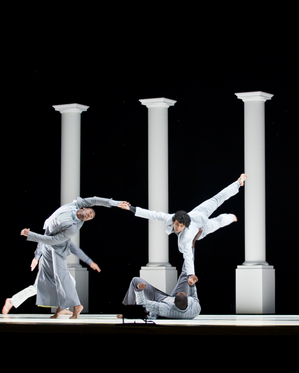Bill T. Jones company saluting Lincoln in Power Center performances
The bicentennial of Lincoln’s birth and the 2008 election of a U.S. president who reveres him have made Abraham Lincoln newly relevant for Americans.

Bill T. Jones/Arnie Zane Dance Company performs "Fondly Do We Hope…Fervently Do We Pray" at the Power Center this weekend.
Russell Jenkins
But for the celebrated African-American choreographer Bill T. Jones, born in 1952, at the start of the civil rights era, Lincoln has been always been an abiding presence.
“Lincoln has been a very important figure to me, very much so,” said Jones, who brings “Fondly Do We Hope…Fervently Do We Pray,” his Lincoln bicentennial dance-theater commission from the Ravinia Festival, to the Power Center for two performances on Friday and Saturday. The visit by his company, the Bill T. Jones/Arnie Zane Dance Company, is part of a University Musical Society residency that also includes a number of free education events.
Spending time at his house high in the New Mexico mountains before Christmas, Jones turns back the clock to a different time and place to explain his feelings about Lincoln.
|
PREVIEW |
“At the time when I made ‘Last Supper at Uncle Tom’s Cabin,’” he said, referring to an early work about slavery and freedom that also enjoyed Ann Arbor performances via UMS, “I said to my mother, ‘Was there ever a time when you didn’t know Jesus?’ She said, ‘I’ve always known Jesus.’ Imagine her, as a sharecropper mother’s daughter. In the evening, when they would go to bed, they would take out the Bible and read passages from the Bible. And just as Jesus was always there for her, Lincoln has always been there for me.”
Lincoln was there, said Jones, in 1954, in the landmark Supreme Court decision in Brown vs. the Board of Education. He was there when Martin Luther King made his 1963 “I have a dream” speech, when King referred to the Emancipation Proclamation as “a bad check, a check which has come back marked ‘insufficient funds.’” He was there when Jones, as a child, would express insolence to his mother by saying “I’m no slave, Lincoln freed the slaves,” Jones recalled with a laugh.
“All this language of liberation goes back to the Civil War,” he said. “To the child that I was growing up in that turbulent time, on radio, on TV, hearing adults talk about (civil rights), Lincoln was always there.”
Once he started working on his Lincoln piece, at the behest of Ravinia President Welz Kauffman, Jones said he began to read and understand more of the man and the history, and “to put it next to the childhood recollections.”
If he had some ambivalent feelings about Lincoln earlier, “Now I’m in love with him.” Jones said.
Jones discusses the making of “Fondly”:
Freedom and liberation have been themes in Jones’ works from “Last Supper” to his most recent essay on Broadway, the hit musical “FELA!” about the Afrobeat legend and political activist Fela Anikulapo-Kuti. (The previous Broadway play he worked on, “Spring Awakening,” netted him a Tony Award for choreography.)
|
RELATED EVENTS• So We Think You Can Dance! Beginning dance class on Tuesday at the Ann Arbor YMCA |
In “Fondly Do We Hope… Fervently Do We Pray,” which draws its title from Lincoln’s second inaugural address, that is no less so, as Jones probes the meaning of Lincoln’s work today and what our hopes are for the future. He matches Lincoln’s complexity with a theatrical amalgam that draws not just on dance, but on words (form Shakespeare, the Old Testament, the poems of Whitman and the speeches and writings of Lincoln); on music (a pulsating, original score inflected by folk and rock); on film; and on stage design.
Watch an excerpt of “Fondly Do We Hope… Fervently Do We Pray”:
“The more and more I think about my work these days, the more I think it is in some ways like Rauschenberg’s ‘Combines,’” Jones said, referring to the artist’s giant collages of found objects that are neither sculpture nor painting but some indefinable thing between.
“He was an early master of the mash-up, and I think in some ways, that is how dance and words work together in ‘Fondly.’ Music is another element; it underlies everything, but works like lighting on a performer.”
Jones explains what he means by citing the song “Glory, Glory, Hallelujah.” When we hear it sung the first time in “Fondly,” we are watching a man dance, he said. The next time, it’s a woman — “It happens to be a white woman,” Jones said — “and this song, as is all the music, is a way of lighting the dancer’s universe and the dancer’s universe in conjunction with the text.
“I’m looking for a kind of freedom” in construction,” Jones added. “I’m asking the audience to join in a kind of game with me, to hold things over time, to make connections where there is no obvious connection. To see a movement idea and hold onto it.
“I’ve been trying to be as free as possible in my dance-making in recent years,” he summed up, “so that dance becomes a play of ideas.”
Susan Isaacs Nisbett is a free-lance writer who covers classical music and dance for AnnArbor.com.

